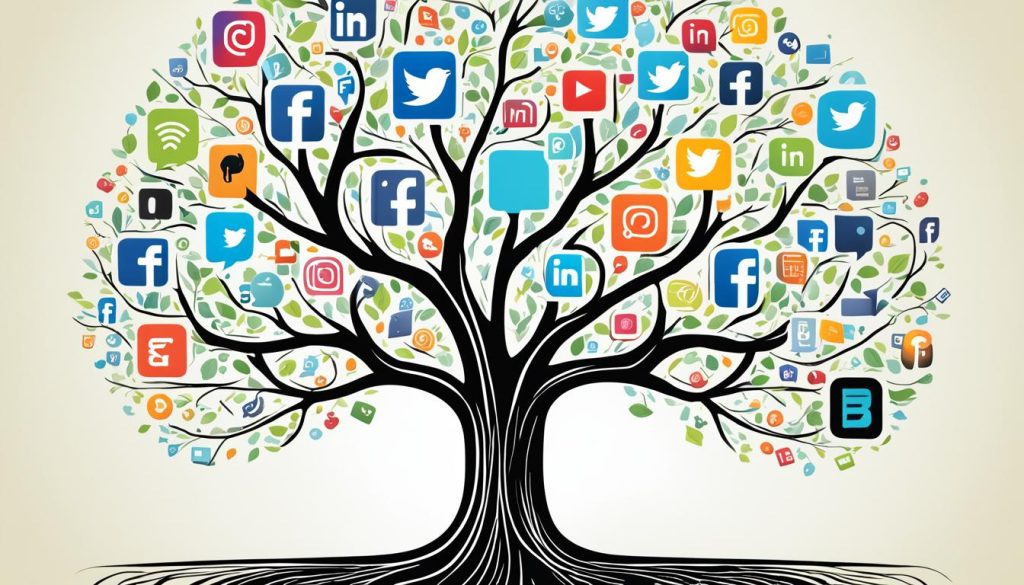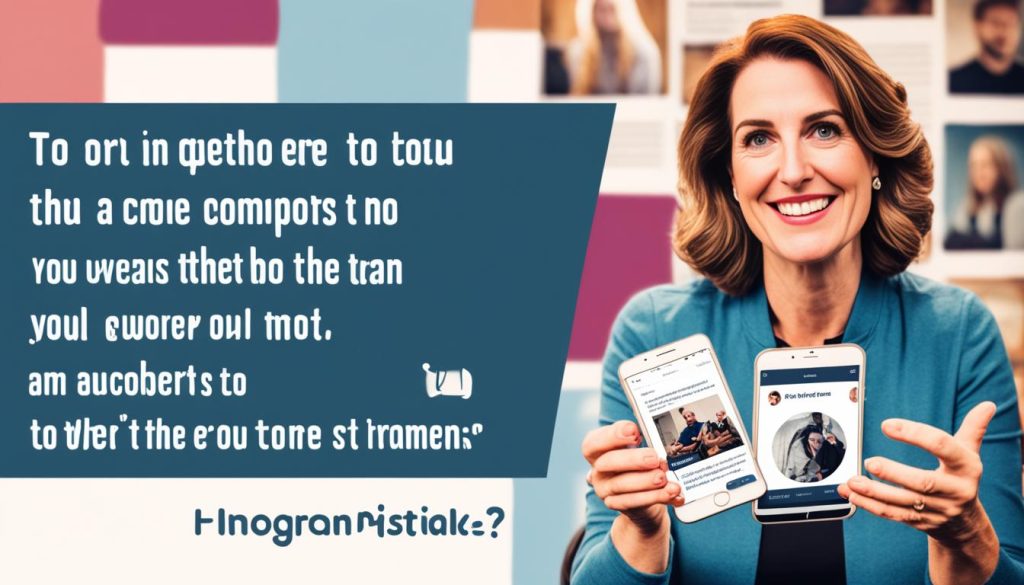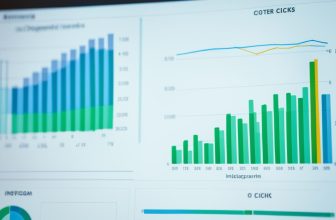In the ever-evolving realm of digital communication, the best social media for authors can be an invaluable key to unlocking vast readerships and fertile grounds for marketing. It’s astounding how author marketing on social media transforms a writer’s reach, enabling stories and messages to permeate through the noise and into the hearts of readers across the globe. Let’s delve into the dynamic social media for book promotion and why staying savvy in this digital domain is non-negotiable for today’s scribes.
The landscape of author social media platforms is diverse, each offering unique ways for writers to weave their narratives beyond the page. Understanding where to direct your creative energies can be the difference between a whisper and a roar in the bustling digital marketplace. From crafting visually compelling content on Instagram to engaging directly with book lovers on Facebook and beyond, social media for writers isn’t just about posting—it’s about creating a shared experience with your audience.
Key Takeaways
- Identify which author social media platforms best align with your brand and audience.
- Use Instagram to visually celebrate your book’s aesthetic and capture your writing journey.
- Build and nurture communities on Facebook to foster reader loyalty and discussion.
- Engage in succinct storytelling and literary conversations on Twitter.
- Utilize Goodreads for its tight-knit book community and direct reader interaction.
- Consider the role of LinkedIn and YouTube in professional networking and multimedia engagement respectively.
Choosing the Best Social Media for Authors
The digital landscape is abuzz with activity, offering a rich tapestry of platforms for authors to weave their narratives and promote their works. Each social media platform presents unique opportunities to engage with audiences and tailor content strategies to fit specific authorial needs. To navigate the current milieu, an author’s guide to the top social media sites for authors is indispensable. Let’s explore the advantages of the best platforms for authors to optimize presence and enhance connectivity with their readers.
Maximizing Visibility on Instagram
Instagram stands out as one of the best social media platforms for writers, pulsating with visual storytelling potential. This image-centric platform is perfect for sharing book covers, snippets of the writing process, and personal engagements—a virtual feast for the eyes that can turn passive viewers into active readers.
Engaging Communities on Facebook
Among the most popular social media for authors, Facebook facilitates community building like no other. Authors can nurture a dedicated community by creating groups and fan pages, providing a fertile ground for discussions, book launches, and reader feedback to thrive.
Concise Interaction on Twitter
Twitter’s brevity fosters concise, potent communication, making it an excellent haven for wordsmiths. It challenges authors to distil their messages, engage in literary dialogues, and leverage hashtags for broader reach, thus proving its worth in the roster of best social media for self-published authors.
Goodreads: A Niche Network for Book Lovers
When discussing the best platforms for authors, Goodreads must not be overlooked. It’s a platform that uniquely caters to book enthusiasts inviting authors to participate in reader-centric discussions, connect through book giveaways, and forge long-lasting relationships with their most passionate advocates.
LinkedIn: A Professional Space for Industry Networking
For the author mindful of industry connections, LinkedIn is the professional networking site of choice. It offers a space to share thought leadership content, connect with publishers and peers, and establish oneself as a serious player in the literary scene.
YouTube and Video Engagement for Writers
YouTube opens the door for authors to embrace video content—from crafting engaging book trailers to conducting intimate interviews. This platform’s rich video format can foster a personal bond with viewers, catapulting the author’s presence into the limelight.
In conclusion, the judicious use of these platforms can catapult an author into new realms of discoverability and reader engagement. Whether an author is traditionally published or self-published, utilizing the top social media sites for authors effectively is critical in carving out a successful space within the literary world.
Strategies for Effective Author Marketing on Social Media

The terrain of author marketing on social media can be as varied and dynamic as the stories authors create. In the quest of maximizing author visibility, it’s essential to appreciate the distinguishing features of each platform. This knowledge enables writers to craft social media strategies for authors that are not only engaging but also inherently effective in driving book promotion.
Paid and organic reach coalesce in the digital marketing sphere, presenting authors with the choice to either build their presence over time or amplify it through targeted campaigns. Organic growth fosters legitimate connections, while paid promotion—and its array of targeting options—can serve as a catalyst for reaching a wider audience more swiftly.
- Diversifying content: Mixing educational, promotional, and interactive posts keeps followers engaged.
- Regular engagement: Responding to comments and messages builds rapport with the audience.
- Consistent branding: Maintaining a unified voice and aesthetic across platforms fortifies brand recognition.
To truly leverage the power of social media marketing for writers, examining the strategies of accomplished authors and examining resources such as “Facebook for Authors: Getting Started Guide” can illuminate the path to success. Furthermore, aspiring authors may benefit from online courses focused on Amazon advertising to enhance their marketing strategy and ultimately, their book sales.
Creating Authentic Connections with Your Audience
The digital era has revolutionized communication, creating expansive networks that bring authors and readers into closer proximity than ever before. Engaging authentically on these interactive author platforms not only enriches reader experience but also establishes a critical bridge between the literary world and its enthusiasts. Embracing new reader engagement strategies is paramount in building lasting author-reader relationships and strengthening authentic author branding online.
Interactive Storytelling on Instagram Stories and Live Sessions
Instagram has emerged as a beacon for visual and interactive storytelling. Here, authors can breathe life into the narrative behind their work, sharing aspects of their writing journey and personal insights—elements that engender a genuine connection with their audience. Utilizing Instagram Stories for time-sensitive content and Live sessions for direct interactions, authors orchestrate a narrative that is both current and relatable, bringing stories off the page and into the dynamic world of social exchange.

Leveraging Facebook Groups for Reader Engagement
Facebook Groups serve as an ideal ground for authors seeking to cultivate and nurture a community of readers. These platforms offer the unique ability to create private spaces, where engaging dialogues can flourish. Here, readers and authors can participate in discussions, share feedback, and celebrate milestones collectively, fostering a sense of belonging and engagement that extends beyond the traditional reader-author dynamic.
Twitter’s fast-paced, hashtag-driven format is perfect for authors aiming to tap into widespread literary conversations. Establishing a presence through engaging in Twitter chats exposes an author to a broader audience, creating opportunities for dialogue with fellow writers and readers alike. By participating in these real-time discussions, authors demonstrate their involvement in the literary community and solidify their position as accessible and responsive figures within the book-lovers’ ecosystem.
In the context of modern publishing, the alignment between an author’s social media presence and their brand is not just a complementary strategy—it’s a fundamental component of their identity and success. Below is a table outlining some key strategies for each platform to maximize connecting authors and readers:
| Platform | Strategy for Connection | Benefits |
|---|---|---|
| Behind-the-scenes content via Stories and Live Q&A sessions | Visual engagement, live interaction | |
| Creating and moderating niche groups for fans | Community building, in-depth discussions | |
| Engaging in literary hashtags and hosting chats | Broad reach, networking with industry |
Through mindful engagement and strategic use of these platforms, authors wield the power to narrate not just their stories, but also the story of their brand—amplifying their voice in a crowded marketplace and resonating on a personal level with their readers.
The Best Social Media for Self-Published Authors
Embarking on a literary career independently requires not just talent in writing but also a proactive stance in self-marketing. For self-published authors, social media is a powerful tool for independent writer marketing, allowing authors to sculpt their digital presence and attract readers. Crafting a comprehensive strategy that encompasses promoting self-published books is crucial for indie authors aiming to create a ripple effect in the vast ocean of literature available online.
To increase book visibility and foster an audience, learning the intricacies and leveraging the opportunities that each social media platform offers can be a game-changer. For instance, Facebook’s wide reach allows for announcements and connections with a broad audience. Instagram, with its visually dominant layout, becomes an excellent platform for sharing book covers and snippets, engaging readers through eye-catching graphics that capture the essence of your work.
It goes without saying, alongside these popular platforms, Goodreads acts as a dedicated literary haven, offering self-published authors a direct channel to book lovers and an avenue for insightful discussions and feedback. Indeed, the key to building a following for self-published authors lies in selecting and concentrating their efforts on the most effective social media channels for their genre and reader demographics.
Let’s examine the optimal social media platforms and how they can be best applied in the context of self-publishing:
| Platform | Main Advantage | Best Usage for Indie Authors |
|---|---|---|
| Widespread audience, Group functionalities | Creating author pages, groups for reader interaction | |
| Visual storytelling, high engagement | Sharing visuals, stories, and updates on writing progress | |
| Quick updates, viral potential with hashtags | Networking with authors, engaging in literature-related conversations | |
| Goodreads | Targeted reader community, book discovery | Interacting with readers, organizing giveaways, and collecting reviews |
Ultimately, the effectiveness of your social media endeavors is deeply intertwined with the values of authenticity and engagement. By providing personal insights, fostering dialogue, and genuinely participating in the literary community, self-published authors can successfully carve out their niche and command visibility in an ever-competitive marketplace.
Conclusion
In examining the impact of social media on authors, it’s clear that these platforms are invaluable for not only promoting written works but also for nurturing a professional brand and expanding networks within the literary community. The advent of social media has reconfigured the landscape of authorship, transforming the way writers engage with their readership and industry professionals. Indeed, social media strategies for authors have proven pivotal in establishing a successful, enduring online presence.
Assessing the Impact of Social Media on Your Writing Career
The influence of social media on writers cannot be overstated. By leveraging platforms such as Facebook, Twitter, and Instagram, authors gain the opportunity to connect directly with their audience, share insights, and build a rapport that transcends the pages of their books. Maintaining social media for writers demands a thoughtful approach; analytics can play a crucial role in understanding audience preferences and behaviors, thus enabling authors to craft more engaging, impactful content.
Choosing Quality Over Quantity
When it comes to a robust online presence, quality social media strategies take precedence over a sheer volume of posts across various channels. For authors, it is fundamental to focus on fostering genuine connections rather than casting the widest net possible. By concentrating efforts on platforms where engagement is strongest, authors can create a more meaningful impact, ensuring that each post resonates with their target readership.
Next Steps After Establishing Your Social Media Presence
Having established a footprint in the digital sphere, the next steps for authors involve refining their social media approach and continuously exploring new avenues for audience interaction. Successful author social media practices are not static; they evolve with the dynamic online environment. Expanding an authorial presence online is an ongoing process, one that requires adaptability, creativity, and an unwavering commitment to authentic engagement.
FAQ
The best social media platforms for authors include Instagram, Facebook, Twitter, Goodreads, LinkedIn, and YouTube. Each platform caters to different aspects of author marketing, from visual storytelling on Instagram to reader engagement on Goodreads.
Authors can maximize their visibility on Instagram by sharing their writing process, book visuals, and cover reveals. Utilizing Instagram Stories, Live sessions, and hashtags related to writing and books can also enhance their presence on the platform.
Authors can engage communities on Facebook by creating author pages, joining and creating Facebook groups focused on their genre or topics, sharing updates, organizing events, and encouraging discussions among readers.
Twitter allows for concise and creative interactions with readers and other writers. It’s a great platform for participating in writing-related chats, using literary hashtags, and quickly sharing news and thoughts with a broad audience.
Goodreads is a specialized network for book lovers. Authors can use the platform to build their profiles, connect with readers, join book discussions, create giveaways, and gather reviews to promote their books.
LinkedIn offers a professional space for networking with industry contacts. Authors can share their achievements, write articles, participate in relevant groups, and connect with other professionals to build their brand and career opportunities.
How can writers use YouTube for book promotion?
YouTube is ideal for creating immersive video content such as book trailers, author interviews, and writing advice. It enables authors to connect with their audience on a more personal level and add a visual element to their book promotion strategies.
Effective author marketing strategies include creating engaging and valuable content, utilizing targeted advertisements, being consistent with social media activity, interacting with the audience, and analyzing the results to refine marketing tactics.
Authors can create authentic connections by sharing personal insights and stories, interacting in real-time through live sessions, responding to comments, and participating in meaningful conversations on various social media platforms.
Self-published authors should focus on building a strong personal brand, actively engaging with their niche communities, utilizing the visual and interactive tools on platforms like Instagram and Facebook, and considering the strategic use of paid promotions to boost visibility.
Authors can assess the impact of social media on their writing career by monitoring the growth of their followers, engagement rates, book sales influenced by social media activity, and feedback from their audience.
Choosing quality over quantity means focusing on creating high-quality content and meaningful engagements rather than trying to be present on every social media platform. This approach leads to a more authentic and sustainable online presence.
After establishing a social media presence, authors should consider analyzing their strategy with analytics, exploring paid advertising options, expanding to new platforms if applicable, and continuously engaging and growing their reader base with fresh and relevant content.







